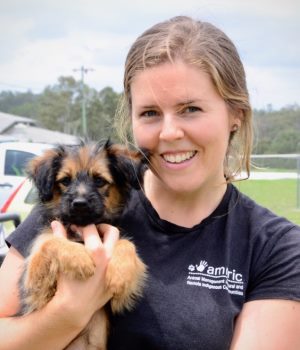 A University of Queensland alumnus is part of a successful team effort providing education, training and improved pet health in Cherbourg, Queensland.
A University of Queensland alumnus is part of a successful team effort providing education, training and improved pet health in Cherbourg, Queensland.
2008 Bachelor of Veterinary Science graduate Dr Bonny Cumming joined the not-for-profit charity, Animal Management in Rural and Remote Indigenous Communities (AMRRIC) five years ago after volunteering as a student with AMRRIC at Kintore, a remote community close to the Northern Territory/Western Australian border.
“It was an eye-opening experience and the most remote place I’d ever been to, 500km west of Alice Springs, but I enjoyed it and jumped at a chance to then join AMRRIC as a staff member five years ago,” she said.
In 2015 the Cherbourg Aboriginal Shire Council invited AMRRIC and the Darling Downs Public Health Unit to help it humanely, and sustainably, address the challenges posed by the community’s largely unconfined and non-desexed dog population.
The Council had received complaints about unwanted litters, dogs knocking over bins, noise from dogs fighting and barking at all hours, and dogs stealing children’s school lunches, while Biosecurity Queensland reported wild dogs harassing and attacking stock on neighbouring farmland.
With the need for a consistent veterinary service evident, Dr Cumming alerted UQ’s School of Veterinary Science to the partnership opportunity. Following further discussion between all collaborators, Cherbourg Aboriginal Shire Council was happy to support two veterinary visits in 2016 and 2017.
“The UQ School of Veterinary Science and staff including Dr Rowland Cobbold, Dr Dan Schull and Dr Greg Simmons have enthusiastically supported the project and the pet health program has grown into an exciting team effort using the expertise of all the partners, who have also provided financial and in-kind support,” she said.
“Once the stakeholders were connected, the group has evolved to make the best use of their expertise.
“For example, AMRRIC is experienced in designing and implementing animal management activities appropriate to rural and remote Indigenous communities; UQ is regarded for delivering high quality services based on evidence-based best practice; Queensland Health Darling Downs Public Health Unit understands legislative requirements; and Cherbourg Aboriginal Shire Council has intimate knowledge of the Cherbourg community and its needs and likely responses to any proposed solutions.
“We’ve also received generous sponsorship from a veterinary wholesaler and a pharmaceutical company to boost the program’s budget.”
Most residents in the Cherbourg community love their animals and treat them as family, and residents have been keen to sign up for free registrations which gives them access to high-quality free animal de-sexing and parasite treatments.
The multi-faceted project includes community consultation and events, veterinary care for animals, school lessons, high school student work experience, and cultural training for UQ’s participating veterinary science students.
Head of UQ’s School of Veterinary Science Professor Nigel Perkins said the program aimed to meet community priorities around responsible pet ownership, improved pet health, and de-sexing of community dogs and cats.
“It includes a clinical elective experience for Bachelor of Veterinary Science (Honours) students, who experience community practice and cultural awareness training,” he said.
Last year Dr Gregory Simmons led a UQ team including Dr Marcia Coradini, Amy Balson, BVSc students (Amy Harding, Amy Cox, Zoe Marr and Kenny Chang), Dr Dan Schull and Dr Fran Shapter
“In three weeks we set up a field hospital and surgery and de-sexed 62 dogs and four cats; microchipped 94 animals; vaccinated 54 animals; treated more than 100 dogs with broad spectrum parasite treatments; and performed general health checks,” he said.
Senior lecturer Dr Schull said with AMRRIC, the team engaged with 188 school students about responsible pet ownership; year two/three primary school students watched the vet team in action, and several Murgon High School students had work experience with the veterinary team.
AMRRIC Education Officer Courtney Falls trained nine staff from Cherbourg Aboriginal Shire Council and UQ in using AMRRIC’s educational resource materials; after-school sessions were held at the Indigenous Knowledge Centre; and 80 community members attended a community BBQ and engagement session.
Professor Perkins said the pet health program was an outstanding success, and thanked the team, including alumnus Dr Lara Marwedel, of Boehringer Ingelheim (which donated a variety of veterinary products including broad-spectrum parasite treatments).
In tandem, the John and Mary Kibble Trust is funding research by Dr Joerg Henning, Dr Steven Kopp and Dr Simmons to investigate canine zoonotic parasite (those transferable between animals and people) in the community.
Dr Cumming said the project team and the Cherbourg community was enthusiastic about a third veterinary visit in October this year and welcomed any support to keep this an annual event. Please visit: https://giving.uq.edu.au/funds/school-veterinary-sciencescvs



